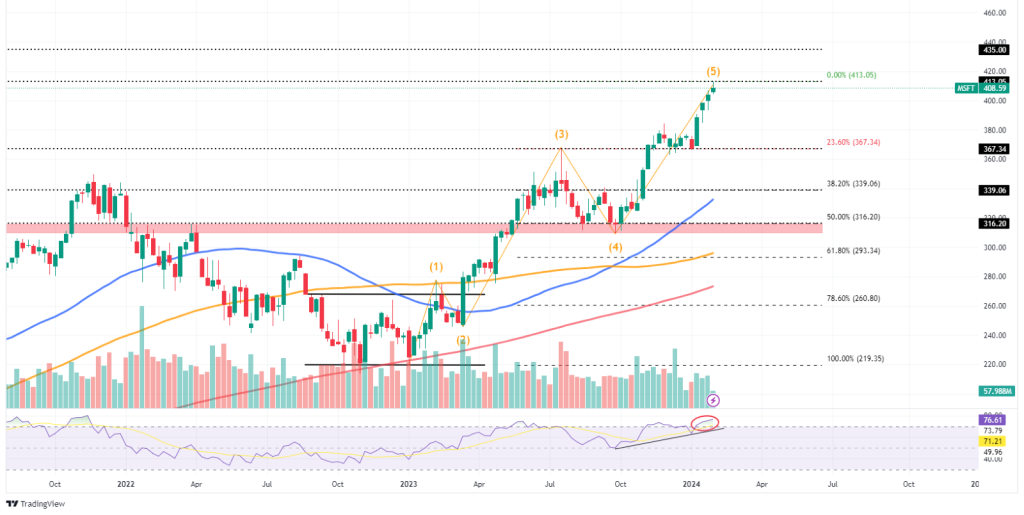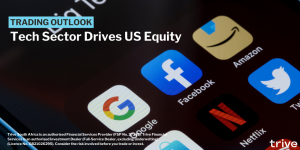
Microsoft Corporation (NASDAQ: MSFT) reported second-quarter earnings with revenue totalling $62.02 billion, marking a 17.6% YoY increase, and earnings per share (EPS) at $2.93, a 26.82% YoY surge, after the bell on Tuesday. While delivering a top and bottom line beat, the figures reflect a +1.62% revenue surprise and a +6.16% EPS surprise. Key segments performed strongly, with Intelligent Cloud showing a 20% YoY revenue increase, Productivity and Business Processes up 13%, and More Personal Computing rising by 19%. The company’s Azure cloud services outperformed, registering a 28% growth, with artificial intelligence (AI) contributing significantly to Azure’s growth.
Despite the positive results and AI momentum, Microsoft’s stock experienced a marginal dip in after-hours trading, potentially reflecting a “sell-the-news” scenario after a 70% rally over the past year. Analyst commentary suggests that the AI narrative, while impactful, may have already been priced into the stock. AI services contributed six percentage points to Azure’s growth in the quarter, doubling from the previous quarter, demonstrating Microsoft’s success in integrating AI across its tech stack. While Microsoft’s share price has rallied over the past year, traders may opt for profit-taking and rotations into cyclical sectors.
Technical
The weekly-hour chart shows that Microsoft’s share is looking to open lower following a decline of over 0.75% post-market following the company’s second-quarter earnings after the bell on Tuesday. The price action currently trades above its upward-sloping 50-SMA (blue line), 100-SMA (orange line), and 200-SMA (red line), indicating long-term bullishness. However, the recent cross of the 50-SMA above the 100-SMA suggests a potential shift in short-term momentum.
At 76.61, the RSI is deep into overbought territory, suggesting a potential pullback could exist, which could offer short-term trading opportunities lower, with the 23.60% Fibonacci retracement level ($367.34) likely to provide significant support. The all-time high of $413.05 would remain firmly in play should the 23.60% Fibonacci retracement level hold. A break above the all-time high on significant volume could confirm the bullish momentum, leaving the $435.00 price level as the next likely level of significance in the short term.
However, a break below the 23.60% Fibonacci retracement level could trigger a selloff, with the 38.20% Fibonacci retracement level ($339.06) and 50.00% Fibonacci retracement level ($316.20) acting as the next significant levels lower.

Summary
Microsoft’s strong Q2 and AI progress faced a lukewarm market response. The technically overbought stock could pull back, finding support at the 23.60% Fibonacci level ($367.34). A hold above this level reinforces the bullish trend, with the all-time high as a potential near-term target. However, a breakdown below initial support could trigger a deeper selloff, likely warranting a cautious approach in the coming sessions.
Sources: TradingView, Trading Economics, Microsoft Corporation, Dow Jones Newswire, Seeking Alpha, Zack’s.
Piece written by Mfanafuthi Mhlongo, Trive Financial Market Analyst
Disclaimer: Trive South Africa (Pty) Ltd (hereinafter referred to as “Trive SA”), with registration number 2005/011130/07, is an authorised Financial Services Provider in terms of the Financial Advisory and Intermediary Services Act, 37 of 2002. Trive SA is authorised and regulated by the South African Financial Sector Conduct Authority (FSCA) and holds FSP number 27231. Trive Financial Services Ltd (hereinafter referred to as “Trive MU”) holds an Investment Dealer (Full-Service Dealer, excluding Underwriting) Licence with licence number GB21026295 pursuant to section 29 of the Securities Act 2005, Rule 4 of the Securities Rules 2007, and the Financial Services Rules 2008. Trive MU is authorized and regulated by the Mauritius Financial Services Commission (FSC) and holds Global Business Licence number GB21026295 under Section 72(6) of the Financial Services Act. Trive SA and Trive MU are collectively known and referred to as “Trive Africa”.
Market and economic conditions are subject to sudden change which may have a material impact on the outcome of financial instruments and may not be suitable for all investors. Trive Africa and its employees assume no liability for any loss or damage (direct, indirect, consequential, or inconsequential) that may be suffered. Please consider the risks involved before you trade or invest. All trades on the Trive Africa platform are subject to the legal terms and conditions to which you agree to be bound. Brand Logos are owned by the respective companies and not by Trive Africa. The use of a company’s brand logo does not represent an endorsement of Trive Africa by the company, nor an endorsement of the company by Trive Africa, nor does it necessarily imply any contractual relationship. Images are for illustrative purposes only and past performance is not necessarily an indication of future performance. No services are offered to stateless persons, persons under the age of 18 years, persons and/or residents of sanctioned countries or any other jurisdiction where the distribution of leveraged instruments is prohibited, and citizens of any state or country where it may be against the law of that country to trade with a South African and/or Mauritius based company and/or where the services are not made available by Trive Africa to hold an account with us. In any case, above all, it is your responsibility to avoid contravening any legislation in the country from where you are at the time.
CFDs and other margin products are complex instruments and come with a high risk of losing money rapidly due to leverage. You should consider whether you understand how these products work and whether you can afford to take the high risk of losing your money. Professional clients can lose more than they deposit. See our full Risk Disclosure and Terms of Business for further details. Some or all of the services and products are not offered to citizens or residents of certain jurisdictions where international sanctions or local regulatory requirements restrict or prohibit them.




